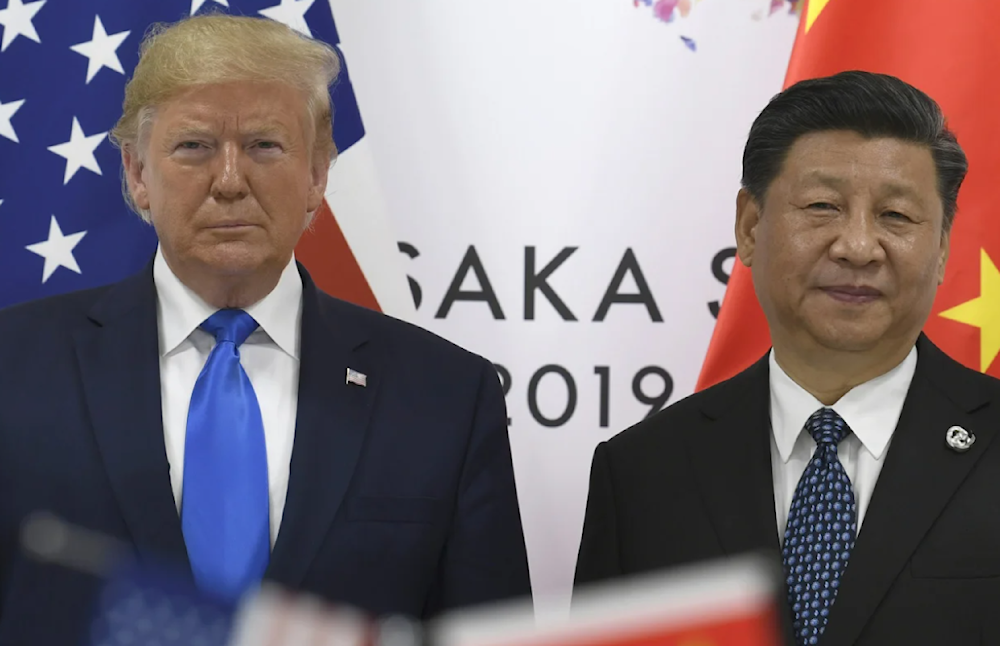Trump launched CIA covert operation against China: Reuters
Three former officials reveal that the CIA formed a small team of spies who used fictitious online identities to build bad narratives about Xi Jinping's government.
-

Donald Trump and Chinese President Xi Jinping during a meeting on the sidelines of the G-20 summit in Osaka Japan in June 2019. (AP)
Former US officials with insider knowledge revealed to Reuters that former President Donald Trump allowed the Central Intelligence Agency (CIA) to launch a covert operation on Chinese social media to turn public sentiment against the Chinese government.
Three former officials divulged that the CIA formed a small team of spies who used fictitious online identities to build bad narratives about Xi Jinping's government while leaking damaging material to foreign media. The endeavor, which began in 2019, had not previously been publicized.
The CIA team, as detailed to Reuters, fanned charges that members of the government were sheltering ill-gotten money overseas and blasted China's Belt and Road Initiative, which provides finance for building projects in underdeveloped countries, as corrupt and inefficient.
Chasing ghosts
The activities within China were designed to instill fear among top authorities, pushing the government to devote resources to tracking incursions into Beijing's carefully regulated internet, according to two former officials. "We wanted them chasing ghosts," one of the former officials explained.
The program, its intentions, or impacts were not commented on by Chelsea Robinson, a CIA spokesperson.
Meanwhile, a Chinese Foreign Ministry spokesperson stated the CIA program demonstrates how the US government exploits "public opinion space and media platforms as weapons to spread false information and manipulate international public opinion."
Read more: CovertAction Mag: How China dismantled CIA ploys
The program was a response to China's increased technological advancements in recent years, prompting Trump to develop harsh criticism of the nation.
A current administration official could not confirm to Reuters if the program was still in effect, but intelligence historians revealed that CIA covert operations usually remain in place throughout administrations when the authority is granted by the President.
China’s Foreign Ministry reported that Beijing follows a “principle of non-interference in the internal affairs of other countries and does not interfere in the domestic affairs of the United States.”
Other sources told Reuters that the operation allowed the CIA to not only be active in China but other nations where the US wishes to influence public opinion, like Southeast Asia, Africa, and the South Pacific.
Officials with knowledge of the CIA plan reported that Matt Pottinger, a former senior National Security Council official orchestrated the authorization, which cited China's use of "malign influence", accusations of intellectual property theft, and alleged threats to US national security.
Loch Johnson, a University of Georgia political scientist who studies the use of covert messaging, revealed that the US has always used such tactics as in the Cold War and the 1950s.
Last month, the Associated Press obtained a memo detailing a years-long covert Operation Money Badger by the US Drug Enforcement Administration that sent undercover operatives into Venezuela to secretly record and build alleged drug-trafficking cases against the country's leadership; a plan the US acknowledged from the very beginning was potentially a violation of international law.
Critics fear the CIA's actions may reinforce what many nations already believe: the US is the embodiment of hypocrisy. After all, nobody meddles in foreign nations and then denounces it on their own soil quite like them.
The CIA; a covert army of mayhem across the world
Last month, Jeffrey Sachs revealed in an opinion piece for Common Dreams that the CIA has 3 major problems that disregard foreign policy and international law. According to Sachs, the CIA's aims and tactics, along with its covert methods and deceptive strategies, ensure a lack of accountability.
He calls Congress a "doormat" and notes that the agency's objectives are whatever the CIA and president determine at the time, irrespective of international and domestic law.
Sachs recalls Mike Pompeo's comments when he admitted, as CIA director, that the agency "lied, cheated, and stole."
The CIA, founded in 1947, has two main missions. One is to provide intelligence to the US government, while the other is to undermine whoever is considered an "enemy" by the current President, by a variety of techniques, including assassinations, coups, manufactured disturbances, arming of rebels, and other methods.
Sachs notes that the second objective has had a destructive impact on global stability and the rule of law in the US. He calls the CIA a covert army of the US "capable of creating mayhem across the world with no accountability whatsoever."
He recalls how former President Dwight Eisenhower orchestrated the 1961 assassination of African president Patrice Lumumba of Zaire.
No attempts to hold CIA accountable
Sachs details the many operations of the CIA in Afghanistan, Serbia, Russia, China, and Syria and how for the last 20 years, it has been "deeply involved in fomenting the growing catastrophe in Ukraine," which is not limited to the overthrowing of Ukrainian President Viktor Yanukovych in February 2014 that triggered a "decade of bloodshed" leading up to the war with Russia.
Sachs expresses that the "continuing mayhem" from CIA operations has resulted in "needless deaths, instability, and destruction" that continue to this day.
He criticizes mainstream media for not questioning or investigating such operations and demanding the release of data that allows the CIA to be held accountable.
The author calls for the urgent need to expose the truth about the "US-led mayhem" and attempt to start a new epoch in which US foreign policy is more "transparent, accountable, subject to the rule of law both domestic and international, and directed towards global peace rather than subversion of supposed enemies."

 5 Min Read
5 Min Read








